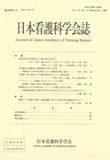Japanese
English
- 販売していません
- Abstract 文献概要
- 参考文献 Reference
- サイト内被引用 Cited by
要旨
本研究はHardyの役割理論に基づいて,介護者と要介護者との介護役割認知のズレを明らかにし,そのズレと負担感への関連性を明らかにすることを目的とするものである.都内2施設で訪問看護を受けている50組の介護者と要介護者の双方に対し,同じ質問項目を用いて面接を行い,両者の間に生じる3種類の認知のズレを抽出した.その結果,以下の知見が得られた.
1.3種類のズレのうち,最もズレが大きかったのはズレB,即ち,介護者の「やってあげたい援助」と要介護者の「やってもらいたい援助」,つまり両者の『期待』認知のズレであった.2番目がズレC,即ち,実際に行われている援助に対する,介護者と要介護者との間に生じる認知のズレであった.さらに,ズレAは介護者が「やってあげたいと思っていること」と「実際に行っていること」との間に生じるズレ,つまり介護者自身の介護役割に対する『期待』と『実際』との間に生じる認知のズレであるが,これは最も小さかった.ズレBとズレCとは相関が高かったが,負担感を規定する要因としてはズレCの方が有効であった.
2.マスローのニード階層に沿ってみると,生理的ニード,安全のニード,自尊のニードの順で,より階層が高い項目ほどズレが大きかった.
3.ズレの内容には,要介護者の依存したいという希望が反映されていた.このことから依存に対する対応が必要であることが明らかとなった.
4.負担感に影響を及ぼしているのは,人間関係,要介護者の性別,ADL,世話時間などであったが,『実際』認知のズレCは拘束時間よりも負担感への影響が大きいことが示された.このことは負担感を軽減する為に介護役割認知のズレからのアプローチが有効であると解釈された.
Abstract
The purposes of this study were, basing on Hardy's role theory, to clarify the cognitive discrepancies between the role of frail people and their care givers, and to relate the discrepancies with the care burden on care givers.
The subjects were fifity pairs of frail people and their care givers in a metropolitan area. Each pair was interviewed using the standard questionnaires. Then 3 kinds of cognitive discrepancies were caluculated. Score A (S. A) is a cognitive discrepancy between the care giver's goal of care and her/his actual care realized. Score B (S. B) is a cognitive discrepancy of the expectations between a frail person and the care giver. Score C (S. C) is a cognitive discrepancy of the atual care between a frail person and the care giver.
The results were as follows:
1. Among the three scores S. A was the smallest and S. B was the largest. But the S. C was most influenced by the degree of care burden.
2. In the view of Maslow's theory on hierarchy of needs, the discrepancy of Esteem needs was the largest, followed by Safety needs, and then physiological needs. It was observed that the higher the stratum of Maslow's hierarchy of needs, the larger the cognitive discrepancy.
3. Contents of discrepancies indicate the tendency of frail people to depend on their care givers.
4. As S. C was most affected by the care burden of care givers, it was suggested that the approach from the viewpoint of congnitive discrepancies between frail person and care giver will be effective to reduce the care burden.
Copyright © 1992, Japan Academy of Nursing Science. All rights reserved.


